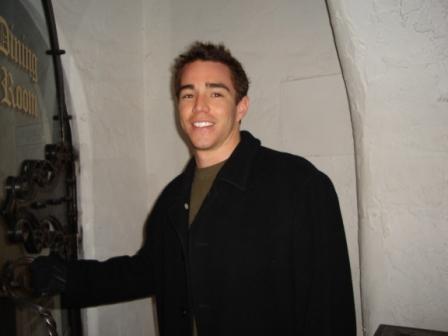Mark Rivera: Difference between revisions
From Santa Fe Institute Events Wiki
No edit summary |
No edit summary |
||
| Line 4: | Line 4: | ||
[[Image:Rivera.comp.jpg]] | [[Image:Rivera.comp.jpg]] | ||
== Answers to Questions == | == Answers to Questions: == | ||
# '''What are your main interests?''' | # '''What are your main interests?''' | ||
#*My interests tend to change as I am exposed to different perspectives. Broadly, I’m interested in how participants of social and economic systems organize themselves – and which individuals or groups tend to be the ‘winners’ and ‘losers’ in these self-organized communities. For my dissertation, I am studying the processes that lead to the emergence of ‘hub’ actors within a communication network of ~1,600 students (i.e. why some students communicate with large numbers of other students while others are relatively isolated). As far as possible, I am trying to integrate findings from physical sciences – such as Barabási’s work on scale free networks – with research from sociology and social-psychology. | #*My interests tend to change as I am exposed to different perspectives. Broadly, I’m interested in how participants of social and economic systems organize themselves – and which individuals or groups tend to be the ‘winners’ and ‘losers’ in these self-organized communities. For my dissertation, I am studying the processes that lead to the emergence of ‘hub’ actors within a communication network of ~1,600 students (i.e. why some students communicate with large numbers of other students while others are relatively isolated). As far as possible, I am trying to integrate findings from physical sciences – such as Barabási’s work on scale free networks – with research from sociology and social-psychology. | ||
Latest revision as of 20:48, 2 May 2008
Hi All, I’m a 4th year PhD student at the Kellogg School of Management. My research is focused on the formation and dynamics of social networks. I’m currently working on a project exploring the emergence of ‘hub’ actors in a communication network of ~1,600 students. I’m really excited to attend CSSS and learn about cool new methodologies. Aside from research, I’m an avid cyclist, skier, and enthusiast of all things related to mountains. I look forward to meeting everyone in June!
Answers to Questions:
- What are your main interests?
- My interests tend to change as I am exposed to different perspectives. Broadly, I’m interested in how participants of social and economic systems organize themselves – and which individuals or groups tend to be the ‘winners’ and ‘losers’ in these self-organized communities. For my dissertation, I am studying the processes that lead to the emergence of ‘hub’ actors within a communication network of ~1,600 students (i.e. why some students communicate with large numbers of other students while others are relatively isolated). As far as possible, I am trying to integrate findings from physical sciences – such as Barabási’s work on scale free networks – with research from sociology and social-psychology.
- What sorts of expertise can you bring to the group?
- I come from a very broad social-science background – economics, social-psychology, and sociology. I think I can contribute to an application of complex systems perspectives in social contexts.
- What do you hope to get out of the CSSS?
- I’m looking forward to learning new methodological approaches; particularly those that focus on networks and network dynamics. I am also excited to see how complexity theory is being used in other disciplines.
- Do you have any possible projects in mind for the CSSS?
- I should have a cool dataset of e-mail communications among ~1,600 students. The dataset is longitudinal over 2 years and begins before any of the individuals knew each other - which should allow for some interesting analyses of self-organization and the emergence of community structure etc. I am hoping to apply methodologies and concepts from CSSS to this data.

